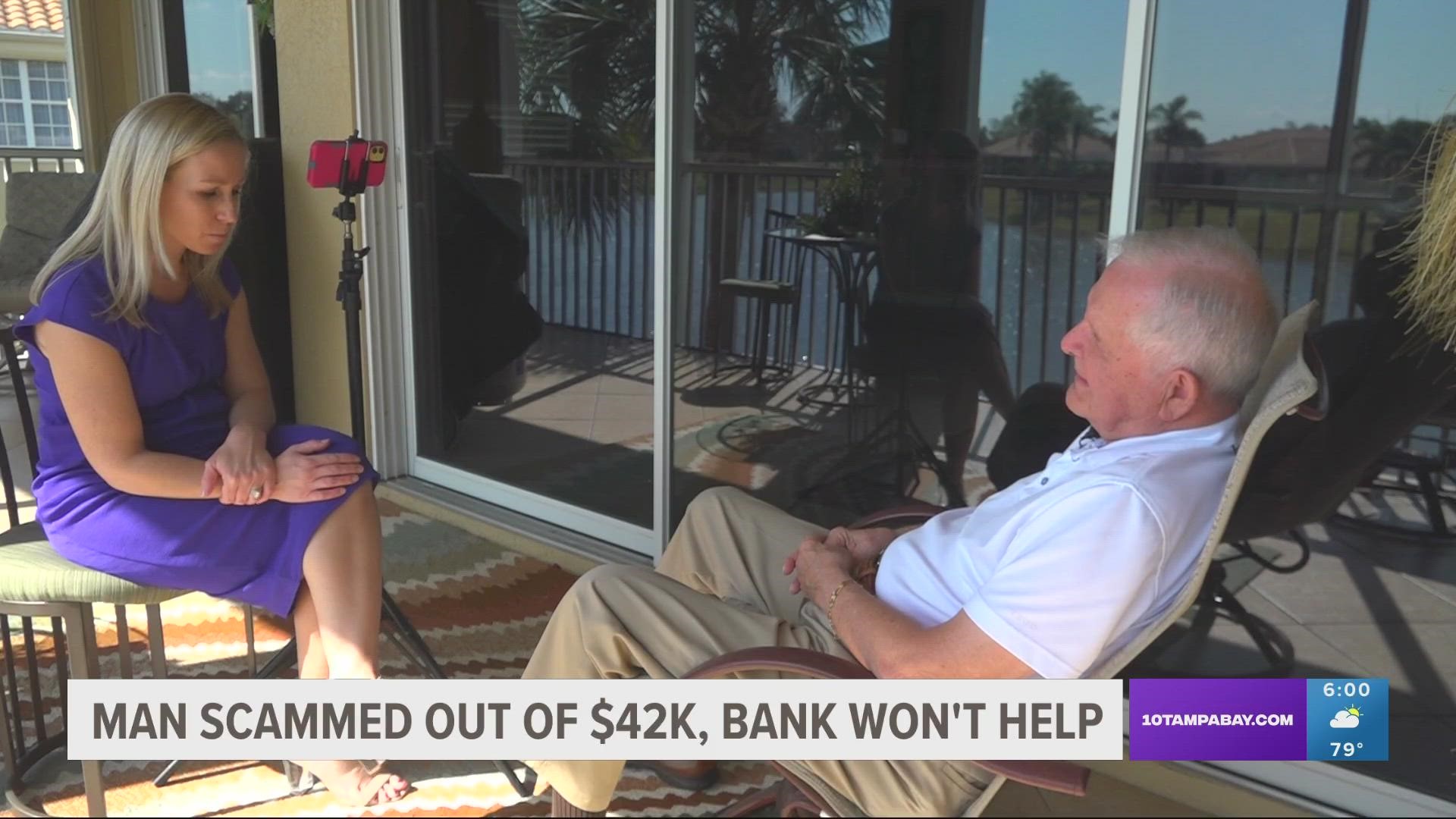SUN CITY CENTER, Fla. — It started with what appeared to be a PayPal e-mail and ended with a wire transfer to Thailand and $42,000 a Hillsborough County man says he'll probably never get back.
Dr. Michael Deeb has been a money man and scholar most of his life. He owned an accounting practice for 25 years and then taught American history and management classes at different universities.
Deeb wrote 11 books in his retirement and now, at the age of 87, enjoys time spent with his wife and family. However, most recently, he's been consumed with fighting back on what he called a scam that tricked him into losing $42,000.
He says it started when he received an e-mail from what appeared to be PayPal alerting him of a $355 transaction. Knowing he hadn't purchased anything, he immediately called the number in the e-mail to dispute the transaction.
"It was pretty much downhill from there. I was entrapped," Deeb explained.
Once he was on the phone, Deeb said the person on the other line was happy to refund the $355 so they asked for his bank account information.
This is when he believes the person behind the phone call got access to his bank account and was able to move $35,000 from his savings to his checking account. The person then told Deeb they accidentally refunded him $35,000 instead of the $355, and they needed him to wire transfer the money back to PayPal.
"In the process of returning, I asked Chase (JPMorgan Chase) to wire that back to them and Chase just very willingly provided a number, a box to put that number and the amount to be sent back to them," Deeb said.
According to Deeb, he never received a phone call or text message from the bank confirming the wire transfer and authenticating that he indeed wanted to send $35,000 to what he said ended up being a bank in Thailand.
"All of a sudden my screen went black, it was blocked."
The following day, Deeb was able to confirm that $35,000 was indeed gone but to his shock, another $7,000 had also been transferred 24 hours later.
Once again, he says he never received an alert or confirmation of the transfer. When he called Chase about the second transfer, he allegedly said, "I didn’t authorize another wire, [and] they said, 'Oh, well we did that on the basis of the first one.'"
And so the fight began.
Deeb hasn't been sitting back and sulking. Since the scam that took a big chunk out of his retirement savings, he's called federal bureaus, the Florida Attorney General, Internet Crime Complaint Center, Hillsborough County Sheriff's Office, 11 different elected officials and others.
Seniors vs Crime, a branch under the Florida AG has been able to offer advice and wrote a letter to JPMorgan Chase on his behalf.
No one has been able to recover the funds.
"My chances are probably slim to none. But I would like, as embarrassing as it is, I would like people to know that this is out there, this is happening out there," Deeb said.
A letter sent to Deeb by the Executive Office of Chase said in part:
"We are unable to credit your account for the wire transfer loss.
We are sorry to hear that you were the victim of a scam.
Unfortunately, since the wires were initiated by you, we are unable to credit your account for the missing funds."
Deeb believes banks should have more accountability when it comes to scams and money fraud.
"This is such a sophisticated business now, the bank needs to give you a backup."
The 87-year-old says a simple call asking for validation of the transfer prior to sending off the funds would have changed everything. He said when wiring money with other banks, he's been asked to provide his mother's maiden name or the city he was born.
"A simple pause by them and requesting a phone call is not costly to them and it’s a simple process. We would have immediately said 'wait a minute.' This is not what we intended to do," Deeb said.
A spokesperson with JPMorgan Chase told 10 Tampa Bay the team has escalated Deeb's situation for further review, and they will reach out to him directly about their investigation.
They also passed along these scam-prevention tips:
- Consumers should protect their personal account information, passwords and one-time passcodes.
- Never click on suspicious links or grant anyone remote access to your phone or computer
- Banks will never call, text or email asking for you to send money to yourself or anyone else to prevent fraud.
- If you want to be sure you’re talking to a legitimate representative of the company that contacted, call the number on their official website.
- If you want to be sure you are talking to a legitimate representative of your bank call the number on the back of your card or visit a branch
- To learn more about common scams and ways to protect yourself visit: www.chase.com/security-tips
This story will be updated if and when Deeb finds a resolution.

